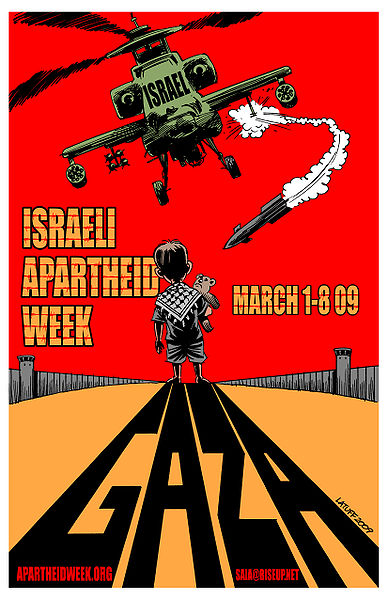Though the first Israeli Apartheid week started on January 31, 2005 in Toronto, the awareness week now commonly kicks off the first week of March. Since then it has spread around the world and is observed in March.
Why Apartheid?
United Nations investigators, human rights activists and critics of Israeli policy have been comparing the treatment of Palestinians comparable to the treatment of black Africans during South African Apartheid for years. Apartheid was originally created as a legal term and involves a list of crimes against humanity.
Activists maintain that in the West Bank area, there are Jewish only settlements, separate roads, military checkpoints and discriminatory marriage laws that prohibit Palestinians from fair and equal treatment. They also argue that the divide in the access to resources and power between Israeli and Palestinians resemble the division in South Africa Apartheid. They compare Israel’s policies to colonialism that was apparent in South Africa during Apartheid.
Goals of the week
Campaigns against Israeli Apartheid attempt to raise awareness to the situation and pressure universities, communities and governments to participate in boycotts, divestments and sanctions (BDS). In July 2005, more than 170 Palestinian groups called for BDS to be put in place and maintained until Israel restored all rights to Palestinians, released all Palestinian political prisoners, allowed Palestinians to return to their homes. Many Canadian institutions, like universities, indirectly support Israel through investments and joint operations with Israeli companies. Activists say that this is complicity to an Apartheid state.
The week also typically includes panels, discussions and protests to raise awareness about the conditions of Palestinians living in Israel.
Controversy
Critics of the anti-Israeli Apartheid movement have called the comparison to Apartheid “offensive.” Prime Minister Stephen Harper, Immigration Minister Jason Kenney and Liberal candidate Michael Ignatieff have all spoken out against the week. Critics have claimed that the week is anti-Semitic. However activists argue that they are organizing against Zionism, a form of Jewish nationalism that supports Israel as a Jewish nation state.



